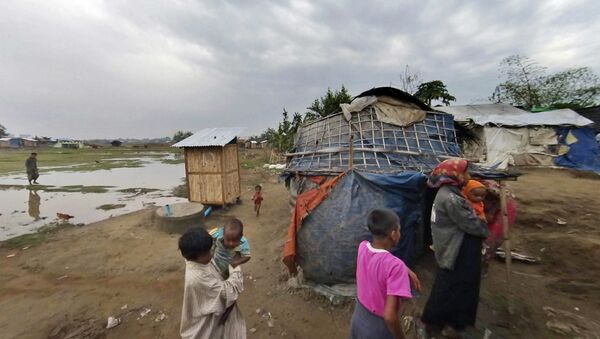MOSCOW (Sputnik) — The executive director of the International Campaign for the Rohingya (ICR), Simon Billenness, has told Sputnik that the lack of pressure by the United Nations on Myanmar encourages the country's government to deny the excessive use of force by its military.
"Given the failure of the UN Security Council to agree on a mere resolution on the Rohingya crisis in Burma, it is clear that this lack of real pressure from the UN on Myanmar will simply encourage the army of Myanmar to continue its attacks on the Rohingya. It will also encourage the government to continue to deny the widespread proof of atrocities by the military," Billenness said.
The head of the non-governmental organization has expressed doubt that the Myanmar authorities would implement its UN Security Council declaration, which urged the Asian nation's government to stop the excessive use of military force in the state of Rakhine, unless pressured politically or economically.
This #Rohingya man & about 70 people arrived in #Teknaf #Bangladesh today. They had to wait 12 days at the border. He said at least 40,000 Rohingyas are waiting to get permission to enter. Interviewed in Burmese language. pic.twitter.com/IZ1yfsMRfU
— Ro Nay San Lwin (@nslwin) 8 ноября 2017 г.
According to Billenness, Rohingya refugees in neighboring Bangladesh have shared stories of multiple violations perpetrated by Myanmar military forces against civilians.
"Despite international condemnation, Burmese authorities continue to restrict access to the region for most international humanitarian organizations, a UN fact-finding mission, and independent media," the head of the ICR said.
The ICR is urging national governments to support a global arms embargo, stop supplying any equipment or providing any training to Myanmar's military, scrap investment into and deals with military-owned companies and review cooperation with the country's government.
‘We run, we skip, it makes us happy!’
— UNICEF (@UNICEF) 5 ноября 2017 г.
Amidst the darkness of the #Rohingya crisis, this friendship will make your heart glow. pic.twitter.com/BKktttzsCK
Significant Step
Dr Simon Adams, executive director of the Global Centre for the Responsibility to Protect, has expressed hope that Myanmar would choose to follow the UN Security Council resolution and stop using excessive force against the Rohingya minority rather than face international isolation.
"Hopefully the Presidential Statement will make the Myanmar authorities realize that there are two paths available to them from here. One leads to further international isolation, bilateral sanctions and the shame of being known as a state guilty of ethnic cleansing. The other is the path of accountability, the rule of law and upholding human rights of all your people, regardless of their religion or ethnicity. I hope they choose the second path," Adams told Sputnik.
According to the head of the non-governmental organization, the official condemnation by the UNSC was a significant step.
"I hope this very public international rebuke will focus the minds of those in Myanmar who have the power to halt the burning of villages and end the mass displacement of Rohingya civilians," Adams said.
#Rohingya Refugees
— Khalsa Aid (@Khalsa_Aid) 7 ноября 2017 г.
We are preparing for the next phase of supporting the Rohingya refugees in Bangladesh.
Details to follow soon pic.twitter.com/X7PTgnxjfH
UN Security Council Statement on Rohingya
On Monday, the UN Security Council approved a presidential statement, similar in format to a resolution, but not legally binding, which condemned the use of excessive military force by Myanmar authorities. Prior to the adoption of the statement, Myanmar has warned that the UNSC declaration could harm the bilateral negotiations with Bangladesh on the repatriation of Rohingya refugees.
Mass grave in #GudaPyin VT, #Buthidaung. A #Rohingya villager told me at least 22 Rohingya dead bodies buried by #Myanmar Army on September 1, 2017. pic.twitter.com/xLKYh7Eets
— Ro Nay San Lwin (@nslwin) 5 ноября 2017 г.
Myanmar's government had previously rejected accusations of ethnic cleansing and genocide in a speech in front of the UN Security Council.
The conflict between the Rohingya minority and Myanmar's military had escalated in August when Rohingya militants attacked government positions. Myanmar's authorities launched a response campaign, which has forced more than 600,000 Rohingyas to flee the country. The actions of Myanmar's military have elicited worldwide condemnation.



